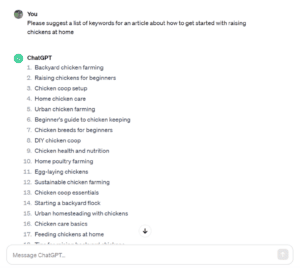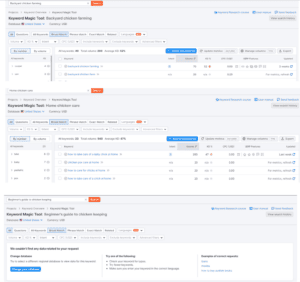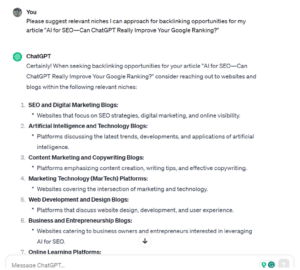
5 HubSpot Benefits That Impact Your Business’s Bottom Line
December 19, 2023
How to Calculate Your Website’s Visitors’ Value
February 2, 2024Who doesn’t love a good shortcut?
In our fast-paced modern lives where the constant pursuit of achieving more prevails, it’s understandable why shortcuts hold such appeal. Whether we’re looking for alternate routes to trim our commute time or the next workout to get us better results in less time, we are highly incentivized to constantly be on the alert for tactics and tools that will empower us to accomplish more with less.
However, this ceaseless drive to improve productivity does not come without its tradeoffs. When it comes to SEO, it can be tempting to outsource the sometimes tedious work that goes into gaining—or maintaining—those search engine rankings to the latest and greatest AI tools like ChatGPT. While ChatGPT can absolutely alleviate some of the tedium of SEO tasks, it’s vital to be mindful of its pitfalls and their potential consequences.
The Advantages of ChatGPT for Marketers
ChatGPT stands out as one of the most prominent players in the AI revolution. In fact, it is the most-viewed English Wikipedia page in 2023. Undoubtedly, ChatGPT’s benefits cross industries and business types, enabling its users to boost productivity with minimal effort.
In the marketing field in general and for content writers in particular, ChatGPT proves exceptionally beneficial in addressing fundamental tasks such as:
- Brainstorming content ideas for all marketing platforms
- Overcoming writer’s block
- Creating content
- Building a content strategy
- Tweaking and rephrasing content
- Conducting grammar and spelling checks
Because ChatGPT can generate and refine content with little human input, it allows content creators to “take shortcuts” and skip a good bit of the most cumbersome writing work. And while a powerful tool, content writers should not drop their pens (or keyboards) just yet. In other words, ChatGPT facilitates a good start for the content generation process, but when it comes to content discoverability, you can’t really count on AI for SEO.
The Limitations of ChatGPT and AI for SEO
Implementing any content strategy without optimizing for SEO is futile. You can have ChatGPT create the most interesting, compelling, reader-friendly content, but this is a job half-done. If this interesting, compelling, reader-friendly content lacks the other parts that make content discoverable and really attractive to people (e.g., strategic competitor analysis, added-value content, positive user experience, etc.), you limit the article’s exposure. Opting for the “easy way” by putting too much confidence in ChatGPT will lead to a dead end, and the responsibility lies with you.
So, in terms of content discoverability and AI for SEO, it’s important to acknowledge that the current version of ChatGPT has several limitations.
Incomplete and Unreliable Keyword Research
Keyword research is the first lesson in every SEO playbook, and as such, leveraging a potent tool like ChatGPT for this critical undertaking sounds promising. So I decided to run a little experiment and asked ChatGPT to provide a list of keywords for a fictitious article. However, it became apparent that relying solely on ChatGPT’s suggestions would have been a risky move.
As you can see in the screenshot below, ChatGPT provided a list of 20 potential keywords, but further examining a sample of them using SEMrush revealed they had poor and even ZERO results.
My prompt in ChatGPT:

SEMrush results:

These experiment results highlight current gaps in using AI for SEO. The keyword research conducted by ChatGPT proved unreliable, also lacking definitive insights into the search volume, keyword difficulty, and search intent. The bottom line is ChatGPT doesn’t give data-driven answers, and those need to be purposefully validated. Blindly implementing ChatGPT’s keyword recommendations without scrutiny might result in a non-SEO-optimized article.
Ineffective for Internal Linking
Internal links are connections from one page to another within your website, and they serve as a crucial factor for Google’s ranking. The more valuable links leading to a specific page, the higher “link authority” of that page. Consequently, Google deems the page more important, increasing the likelihood of achieving a better ranking.
Incorporating good internal links involves accessing the backend of a site’s Content Management System (CMS) to identify related articles. Most websites utilize platforms like WordPress or HubSpot CMS, but whichever one it is—ChatGPT doesn’t have access to it. Practically speaking, ChatGPT lacks this contextual view, hence it is incapable of incorporating internal links or advise on which other pages on your website you can link to. This task requires manual intervention, and ChatGPT is unable to perform this work for you.
Minimal Support with Link Building Outreach
The concept behind link building (also referred to as backlinks) is similar to internal links: the more valuable backlinks lead to your website, the higher the web page’s “link authority”, and higher the ranking. However, unlike internal links, link building requires proactively pitching external websites to link back to you.
AI can provide some assistance in this process. For instance, you can leverage ChatGPT to generate a list of potential websites for backlinking opportunities, and you can then follow up with another prompt, asking ChatGPT to create an outreach email template.

Sure enough, ChatGPT swiftly provided the list above. But from this point, the majority of the work remains a manual task necessitating a human touch. First, you’ll need to determine whether the suggested websites are relevant. In my case, the suggested options were not entirely fitting, as some niches are direct competitors. Next, you’ll have to research and identify suitable websites to reach out to. Lastly, you’ll need to utilize the template generated by ChatGPT and personalize each email to align with the blog’s nature and the individuals behind it. While ChatGPT aids in the initial steps, achieving an impactful link building depends on strategic, hands-on human fine-tuning.
ChatGPT Has Nothing to Do with Technical SEO
Technical SEO can be an intimidating aspect for content writers, and fortunately, attending to it is not necessarily related to the content writing process itself. That said, technical SEO holds immense significance for Google ranking, and it simply can’t be overlooked.
Technical SEO focuses on organic ranking factors tied directly to how your site is built, including crawlability, page load time, mobile friendliness, and more. With that in mind, it’s evident why ChatGPT has no bearing on technical SEO.
Zooming in on the technicalities of ChatGPT, it’s essential to understand that ChatGPT is a Large Language Model (LLM). In human language, it essentially means that ChatGPT is trained to work with words. Hence, it has nothing to do with how the website is engineered in the backend.
Outdated & Inaccurate Information Decreases Domain Authority
ChatGPT doesn’t draw information from everything that’s on the internet; as of December 2023, its knowledge cuts off in April 2023. This means that ChatGPT generates responses using data available up to that point. Current events and every piece of content written after April 2023 remain out of ChatGPT’s sight, hindering its ability to provide up-to-date prompts. Moreover, while its language capabilities are impressive, the accuracy of its output can’t always be guaranteed. ChatGPT itself even acknowledges it in a disclaimer:

Inaccurate information not only poses a risk to brand reputation but also affects Google ranking. When content is perceived as untrustworthy and irrelevant by users, it triggers a negative ripple effect. Namely, lower website traffic, increased bounce rates, and limited potential for link-building initiatives cause Google to decrease your domain authority, and this translates into reduced ranking.
The takeaway is that when writing for inbound marketing, it is your responsibility—and duty—to fact-check ChatGPT’s content. There is no way to avoid manual work.
Is AI for SEO the Way to Go?
There’s no denying that ChatGPT and other AI tools can do wonders, allowing users to get rid of some tedious work, save time, and increase their productivity and even the quality of their work. However, users should avoid the temptation to “fire and forget”; otherwise, the outcomes would be just the opposite.
In the context of AI for SEO, ChatGPT can indeed help you improve your Google ranking, but there’s less room for shortcuts than you’d hope. ChatGPT is a fantastic tool for the content framework, but it can’t replace the human element. Until ChatGPT expands its capabilities, an integrated approach leveraging both human optimization and AI efficiency seems the safest choice for content discoverability.
As humans and machines each have their distinct roles to play, it’s recommended that businesses implement an AI risk management strategy and look into AI consulting services. This approach will not only promote responsible AI usage by your teams, but also provide them with the tools and guidance to harness AI capacities for the best results possible.









